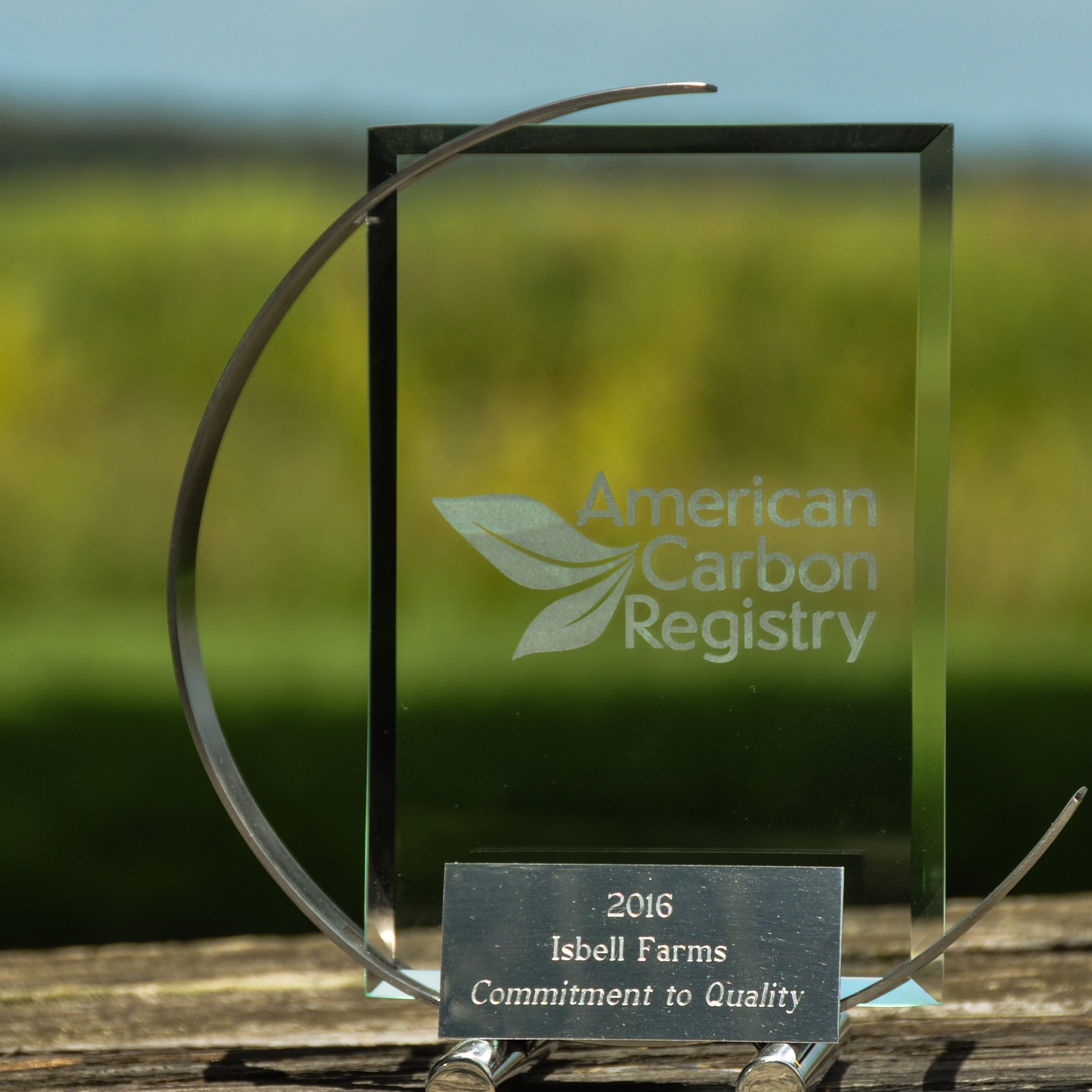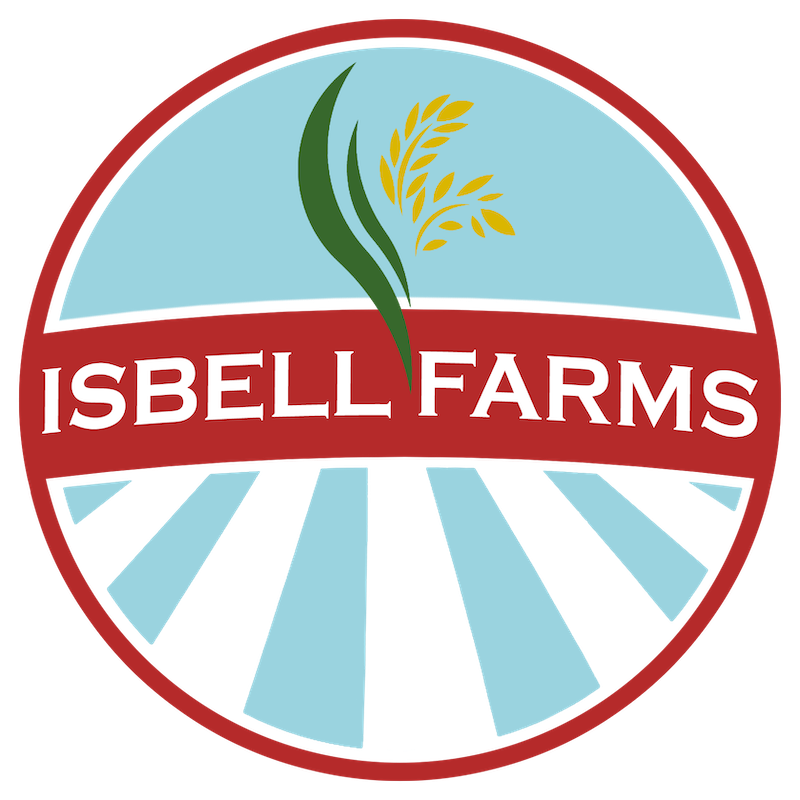Sustainability
Isbell Farms has a Gold ranking in the SAI sustainability platform.
You can view our SAI Assessment here.
At Isbell Farms, sustainability is part of our heritage and part of our future.
Our initial goal was simply to do the right thing and do it well. It was only later that we learned that others had started using a word to refer to what we had long considered a core value: sustainability. We think of it in terms of stewardship.
Isbell Farms leads the way in sustainable rice production through water use reduction, methane emission reduction, energy use reduction, and the creation of carbon offsets.
For these activities, Isbell Farms was the recipient 2016 Commitment to Quality Award from the American Carbon Registry.

Water Use and Greenhouse Gas Emissions
A considerable portion of consumers’ carbon and water footprint comes through their consumption of food. By applying innovative farming techniques, including Zero Grade Farming and alternating wetting and drying , Isbell Farms is able to assist consumers in lowering their water and carbon footprints. Water savings of over 50% are common and methane reductions of over 50% are possible using the techniques employed at Isbell Farms, all while increasing water quality and providing wildlife habitat.
Work toward more efficient use of water on our farm began over 35 years ago. Not only have we worked to enhance our sustainability over the years, but we have also seen it as our responsibility to share these techniques with others by hosting hundreds of other farmers from throughout the United States and across six different continents.
Isbell Farms also maintains a robust relationship with researchers within the academic and environmental community to ensure that we are part of the continual advancement of agricultural solutions to environmental challenges.
We are currently in the fifth year of a multi-year research study conducted by the University of Arkansas and the Agricultural Research Service that actively monitors both methane and nitrous oxide emissions on research fields. This research project will lead to further advancements in our understanding of methane and water use reduction.
Energy Use
Solar
Since 2018, much of Isbell Farm’s energy use is being generated through their on-farm solar project. This 300KWH solar farm provides power for irrigation, grain drying, farm-shops and residences. When all of the generated energy is not in use by Isbell Farms, the power is transferred to the local power grid through net metering.
Grain Drying
Isbell Farms also uses computerized natural air grain drying technology that uses active feedback from sensors within our grain bins to limit aeration to times when it is most energy efficient. This allows us to reach consistent moisture throughout our grain storage, leading to significant energy use reductions and grain quality improvement.
Irrigation
The irrigation system on Isbell farms is not only designed to reduce water consumption reduce water consumption, but also to reduce energy use. The irrigation system on Isbell Farms is virtually 100% electric, leading to more efficient pumping of water with priority given to higher gallon-per-minute options when available. We are also connected to a network hosted by our electrical co-op that allows the co-op to temporarily stop our irrigation pumps during peak demand. This system leads not only to greater efficiency of electrical use on our farm, but throughout the entire regional electrical grid.
Field Operations
Isbell Farms employs No-Till techniques whenever possible. This limits the number of tractor passes across a field, not only benefiting air, water, and soil quality by minimizing compaction and erosion, but also by reducing fuel consumption. Isbell Farms also uses Tier 4 (link) engines with fuel-saving transmission in all of its harvesters and tractors that complete the bulk of field operations on the farm, reducing both fuel use and emissions.
Collaboration and Sustainability
At its core, sustainability is about collaboration. From the seed companies that produce more robust and energy efficiency varieties, to academic researchers and other farmers who develop new knowledge and techniques, to equipment companies that continually move toward greater efficiencies, we believe that it is the integration of all of these components that make higher levels of sustainability possible. To that end, we collaborate with others at every opportunity as together we seek to continually evolve agriculture to the next level.
More About our Commitment to Sustainability
Isbell Farms is a member of Nature’s Stewards, an alliance of like-minded farmers focusing on innovative methods of creating ecological benefits through agricultural practices.
We are also collaborators on a Conservation Innovation Grant from the USDA that seeks to broaden the adoption of methane mitigation techniques through market based incentives and a Conservation Innovation Grant researching the beneficial use of algae in no-till, low water use rice production. We participate in the United States Department of Agriculture’s Natural Resource Conservation Service’s Environmental Quality Initiatives Programs and the Conservation Stewardship Program.
Mark Isbell is a board member at Field to Market and sits on the USA Rice Sustainability Committee, where he co-chairs a work-group focused on relationships with organization’s sustainability initiatives. He has delivered presentations at conferences for farmers within the rice industry as well as those within the environmental community. Mark was also a crop irrigation work group member during the recent update of the Arkansas Water Plan.
